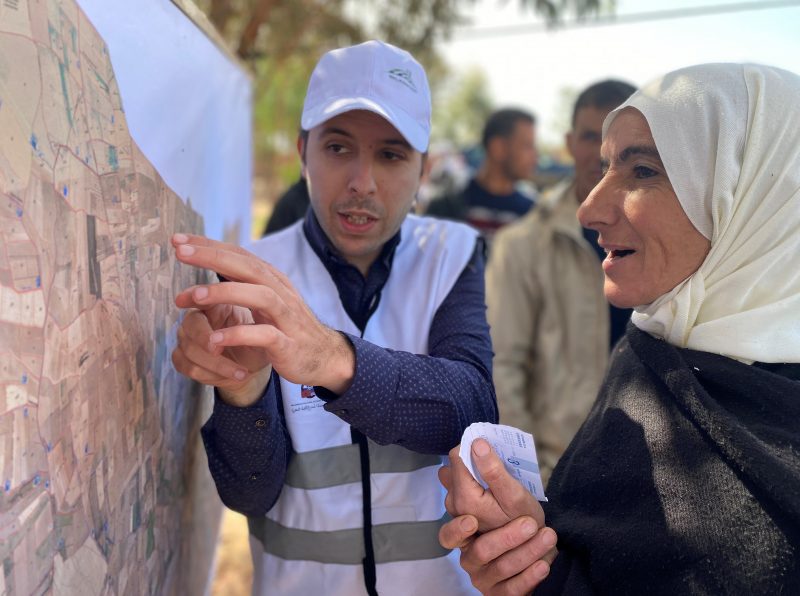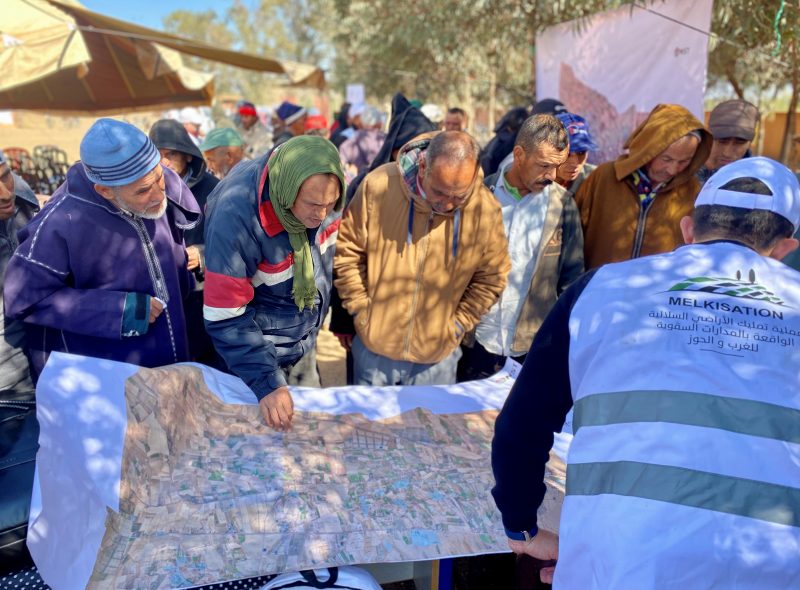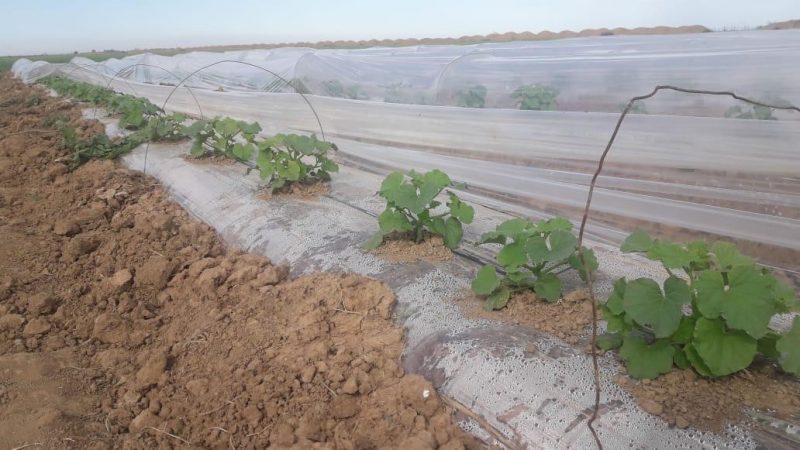
Annie Thompson
A future land title holder confirms the location and boundaries of her plot on the draft parcel map for the collective of Ouled Sbih (Haouz region), February 2020.
MCC’s land titling investment under our Morocco Employability and Land Compact complements the Government’s “Green Morocco Plan.” The Plan supports agricultural intensification, including providing financial support for land-titled farmers that will make irrigation and water saving technologies, agricultural equipment, and mechanization more affordable.

Annie Thompson
Community members validate the draft parcel map, which represents current land property rights to be formalized through delivery of land titles with the support of MCC. Ouled Sbih (Haouz region), February 2020.
Risks to agriculture in the Gharb and Haouz regions
Despite the investments in water saving technologies, agricultural intensification could raise demands for water resources because of increases in both irrigated areas and in water requirements for some of the higher value crops. While clear, formal rights to a plot of land can provide an economic boost for farmers, the sustainability and performance of their investments may be compromised if climate risks such as drought, water scarcity, and flooding are not considered. Recognizing these risks, MCC assessed current and potential future climate impacts to agriculture and water resources in the Gharb and Haouz regions and identified strategies to enhance resilience to climate-related crises.Over the past several decades, the Gharb and Haouz regions have experienced both a decline in rainfall and higher temperatures, resulting in more frequent droughts and water stress. Aquifers in the region are already overexploited and increasingly salinized. Extreme climate conditions lead to greater agricultural water requirements, declining yields, and reductions in groundwater recharge and surface water. These negative impacts on water and agriculture will likely be exacerbated under a warmer and drier future climate, where drought conditions are expected to be more frequent and intense. These changes in climate could negatively affect the long-term sustainability of agriculture and water resources.
Taken together, planned agricultural intensification, increased water requirements, and declining water availability under extreme climate conditions will increase water stress. The combination of projected increases in water demand and reductions in water supply under an extreme climate scenario is expected to cause a negative water balance before 2030 in the water basin that supports the Gharb region, and to increase the water deficit by 2030 in the Haouz water basin.
Taking a climate-smart approach
Based on this analysis and discussions with water and agricultural managers in the Moroccan Ministry of Agriculture, MCC and Millennium Challenge Account (MCA)- Morocco, our implementing partner in the country, recognized that targeted interventions are needed for farmers to build longer term resilience and to realize the full intended benefits of the land titling initiative. Indeed, the new Intergovernmental Panel on Climate Change (IPCC) Special Report on Climate Change and Land confirms the importance of stronger land rights for building climate resilience, noting this as a major factor contributing to the adoption of climate-smart agriculture (CSA) practices. The benefits of CSA are particularly important to low-income farmers, since they are likely to be especially hard-hit by the impacts of climate variance.In November 2019, MCA-Morocco and the Moroccan National Office of Agricultural Counsel (ONCA) signed a partnership which includes targeted support to farmers alongside the land titling operations to adopt more climate resilient technologies and practices. This includes facilitating access to Government of Morocco financing for drip irrigation technology and capacity building for use and maintenance of the technology, as well as training on soil conservation approaches for lower greenhouse gas emission and choice of more drought-tolerant seed varieties.

Hamza El Hassouni, MCA-Morocco
Parcel outfitted with greenhouse drip irrigation to grow Galia melon in the collective of Rcem, Sidi Slimane Province (Gharb region), March 2020.
By strengthening land rights for farming families while promoting climate resilient agriculture, MCC is working to help rural farmers in Gharb and Haouz increase their productivity, generate higher incomes, and reduce crop losses in the face of potential climate shocks. Moreover, MCC’s work in Morocco aligns with the White House’s Women’s Global Development and Prosperity initiative, which aims to advance women’s economic empowerment across the globe. In providing women with better access to credit, agricultural inputs, functional literacy training, income generating opportunities, and more secure land rights, MCC’s efforts in the country will help ensure greater prosperity and stability for women in the long-term.
Overall, MCC’s Morocco compact will help ensure not only that MCC investments in the formalization of rights to rural land are effective and sustainable, but also that farming families in the region will gain more security and prosperity in the long-term.

